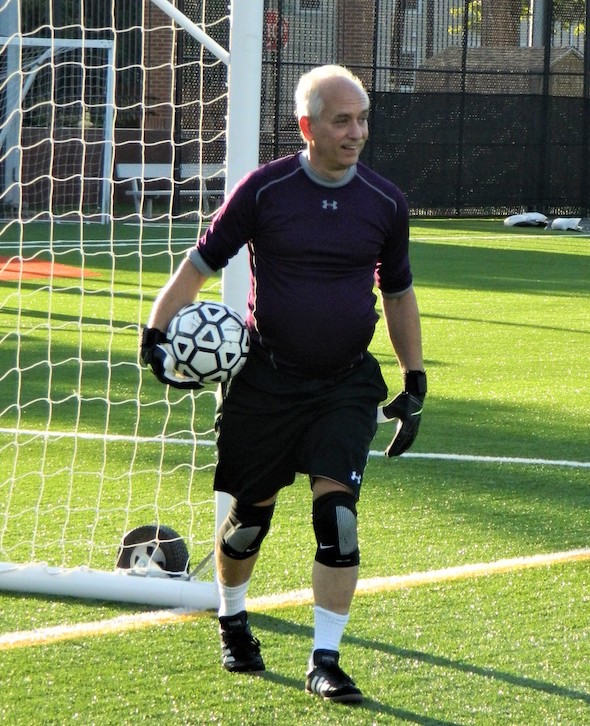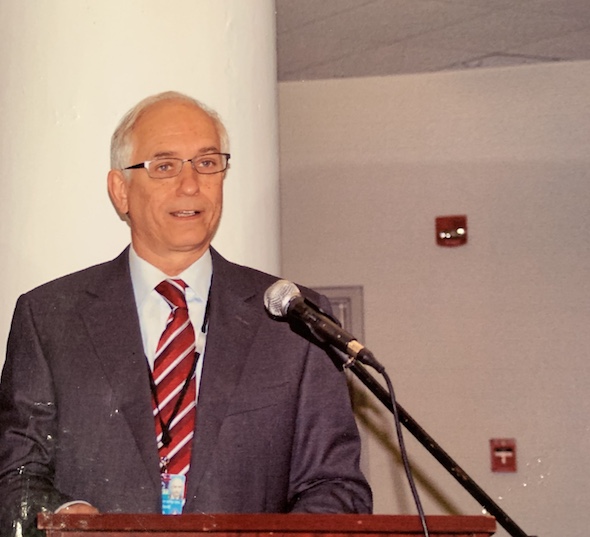“I never really liked working for anyone,” he chuckled. “That’s why I was a goalie.”
Leading teams to provide defense against opponents has been a constant in the life of alumnus Ronald Thomas ’73, which is reflected in his journey as he progressed from being a four-year, starting goalie for Gannon’s men’s soccer team to the now retired CEO of McNeil Technologies.

Thomas returned to his alma mater in 2011 to once again defend the net as goalie in an alumni reunion soccer game.
The proud son of a grocery store owner, Thomas began this journey when he set out to follow his father’s footsteps by enrolling in Gannon University’s business program. It was here that he discovered his passion for economics after meeting the memorable Rev. Robert Susa, former Associate Professor of Economics, who left a lasting impression on the students he served, including Thomas, for nearly 50 years.
Thomas credits the pairing of his economics education with the liberal arts foundation of Gannon’s core curriculum for guiding him throughout a successful career.
“My Gannon education made a difference in me advancing my career,” said Thomas.
“Having an economics degree gave me a good understanding of how things work from a financial and business side. As I look back and get a real chance to reflect, the core curriculum at Gannon provided me with a broader perspective on the world and a foundation for conducting myself in an ethical manner.”
Thomas earned his Bachelor of Arts in Economics from Gannon in 1973 and continued his education in Washington, D.C., where he earned his Master of Arts in Economics from Georgetown University in 1975.
“My Gannon education made a difference in me advancing my career.”
After graduating, Thomas experienced several varying sectors of economics, stepping into his first job with the National Planning Association, completing regional and national economic forecasting. From this position, he gained interest in and began work with companies providing government contracting. Following this, Thomas ventured out with a couple of business partners to begin their own company, which he now calls “one of my best learning moments,” as the company went out of business shortly after.
This was a stepping stone on Thomas’ journey, though, as he then became partner of Meridian Corporation, where he helped build the company by acquiring contracts with government entities such as the Department of Energy, completing economic and energy analyses for conservation and renewable energy.
After becoming acquainted with James McNeil, the namesake and founder of McNeil Technologies, Thomas then began working for the company and was brought on board as President from 1996-2004 before becoming CEO until his retirement in 2012.
Throughout his tenure here, Thomas was responsible for the strategic direction and management of building and expanding McNeil’s overall business base, which provided professional services to the Federal Government such as security-based and information technologies, intelligence and language support, national security, as well as energy, labor and logistical services.
Through McNeil Technologies’ clientele and the rapidly evolving services they needed due to historical national security events and the ever-changing technology landscape, Thomas gained ample experience adapting to emerging trends in cybersecurity and secure intelligence technology.
His experience ranged from working with the Transportation Security Administration (TSA) to develop private security screening services following the attacks of 9/11, to working with Department of Defense agencies to support business intelligence that analyzed mass amounts of data to report on cultural tendencies of various populations to aid troops on missions.
“Students will be involved in this type of technology no matter what their educational background is– and they don’t have to be the sharpest computer programmer to be the CEO.”
“After 9/11 there were a lot of programs that came out in national and general security. The word ‘cybersecurity’ was not prominent. Then, over time, it started to gain a foothold and began to exist in certain components of the government. Today, I’d tell you it exists in every component of the government. This grew out of the war on terror. As people became more skilled at computer operations and adapting to the technology environment to disrupt things, there became a need to address what was going on to prevent attacks, whether they are disrupting shopping or disrupting intelligence operations.”

Thomas speaking to the McNeil Security Team in Rochester, New York.
Equating the current scope of the cybersecurity industry to demand and supply economics, Thomas expressed the growing need for knowledgeable professionals in this industry. “Students will be involved in this type of technology no matter what their educational background is– and they don’t have to be the sharpest computer programmer to be the CEO,” said Thomas.
“My journey has been an enjoyable journey because I got into a field where I could adapt and do different things depending on what my interests were and what was going on in the world,” he said. “I was very fortunate I was able to be successful in that environment.”
Thomas largely credits his family for helping him achieve that success.
“My success was dependent on the support and encouragement of my wife, Karen. We have been married almost 30 years, and have one lovely daughter, and three fun and energized grandchildren,” Thomas endearingly expressed.
“Part of why I was involved in the business world goes back to my roots, learning business from my father.” He chuckled and went on to say, “I think he would smile today and say, ‘Well I finally taught you something.’”
.jpg)
Thomas enjoying his most current role of grandfather to his three grandchildren: (L-R) Ella, age 7; Joey, age 4; and Thomas, age 2.